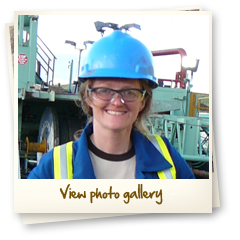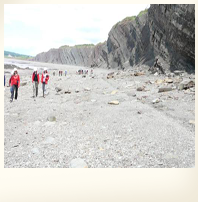

I am a scientist, a traveller, a biker and an adventurer. Life is full of variety and there is always something new to learn or to experience. I work for Nexen Inc. as an Exploration Geophysicist which means I help find new pools of oil and gas. After my undergraduate degree in Geology and Honours in Geophysics, I left New Zealand to backpack around the world and Central America, Europe and Africa - just for fun! Later I came to Canada and got a PhD in Exploration Seismology (geophysics). While at grad school, I travelled to international conferences, taught field schools and lab classes, and co-authored a textbook on seismic interpretation. I also spent time working with companies such as BHP Petroleum, Occidental Petroleum, Exxon Mobil and Veritas to gain work experience. Now that I am at Nexen Inc., I still enjoy the international travel, teaching geophysics, giving presentations, mentoring and being involved with drilling wells and seeing the results of our exploration. In my spare time, I am travelling internationally or riding a motorcycle. I have four (a road bike, faster road bike, dirt bike and dual purpose bike). In the past few years I have travelled for fun to Turkey, Malaysia, the US, the UK and home to New Zealand. I truly believe that life is meant to be enjoyed and that we are responsible for making our personal lives and our careers as interesting as possible.
 Q: What is the title of your job and what do you do?
Q: What is the title of your job and what do you do?A: Geophysicist / Geoscientist. As a geophysicist I interpret seismic data and help determine where our group will focus their exploration and ultimately drill wells. Currently I am working as a geoscientist in Formation Evaluation which means that I analyse the data after we drill a well to see whether the well was successful or not.
A: I work for Nexen Inc., Calgary, Alberta.
A: I work 8 hours and 40 minutes a day when in the office because our company gives us every second Friday off. When I am in the field I work the hours that are necessary in Yemen that is 12 hours on every day (6am - 6pm) but in Canada it could be for as long as I can stay awake.
A: I normally work in the office but try to get in to the field as much as I can so I can see the data being gathered. I am based in Calgary but have travelled to the USA, Colombia and Yemen for work.

A: My main piece of equipment is my computer! We use both PCs and Unix machines so that we have all the computing power needed. Many geoscientists have a cell phone or a blackberry so that they can respond to requests instantly.
A: The minimum requirement to be a geophysicist is a BSc (typically a 4 year degree). Many people now have an MSc or a PhD.
A: An inquisitive mind. A dose of patience. An ability to work in teams. A need for challenges.
The 2008 APEGGA salary survey showed that geophysicists earn from $50,000 to $200,000 per year depending upon experience and job description. You could expect to earn $80,000 within 5 years. In addition to base pay we also receive bonuses, saving plans, the opportunity to buy / receive stock and excellent benefits.
 Q: What do you like best about your job?
Q: What do you like best about your job? A: I love the variety. One day I am interpreting a seismic section so that our team can decide where to drill a well and the next day I am looking at land sale opportunities. There are many types of data available to me: seismic, gravity, magnetism, lidar, etc. I spent 3 weeks in Yemen working at the Central Processing Facility (Nexen's main base) and was able to drive around the desert to different wells. A few years ago I presented some work at a conference in Cartagena, Colombia, and have also travelled to conferences in the USA. As well as variety. I love teamwork. I have the opportunity to work with many talented geologists, engineers, petrophysicist, managers, land men and technologists. We also work in partnership with the community so we liaise with first nations, landowners, government official and other stake holders' - all the people involved.
A: As a geophysicist for an oil and gas company there are lots of advancement opportunities either to senior geophysics positions or into management positions. There are also opportunities to work as a consultant giving you more control over the work that you choose to do and the hours that you work.
A: My job is not very physically demanding but it is helpful to be reasonable fit for field trips (hiking about outside), and for field visits (walking around well sites and seismic areas).

A: I started a science degree at university because I loved physics and chemistry in high school. And because I love the outdoors I took geology as an option so I could go on field trips for 3 weeks a year. After my first year I found that I loved geology more than physics / chemistry, so I majored in geology. But I had a knack for geophysics. I like the quantitative nature of it being able to make measurements of the Earth rather than just describe it. And most importantly, we got to do seismic experiments and set off explosions! You could say that my career started with a bang. I am from New Zealand and was going to work with earthquakes, but heard that the oil industry was really interesting so I came to Canada in 1998, did my PhD at the University of Calgary, and started with Nexen in 2004.
A: After my undergrad degree I took a few years off to backpack around the world - I thought that I had had enough of earth science. Travelling across Africa was a large part of my trip and as we crossed a large flat land in Kenya we approached a cliff edge and looked down. I was in awe. There was a huge crack in the earth as far as I could see. I was standing at the edge of the Great African Rift and that moment made me realise that the earth truly fascinated me - I needed to return to geoscience.
A: Work hard, take all the training that is offered to you and find a good mentor. Pick an aspect of the job that you love a geophysicist could be in the field, and office or a combination try out a variety of jobs to see what suits you best. If you are not enjoying what you are doing, try something else. As a scientist you have the skills to do many different jobs.